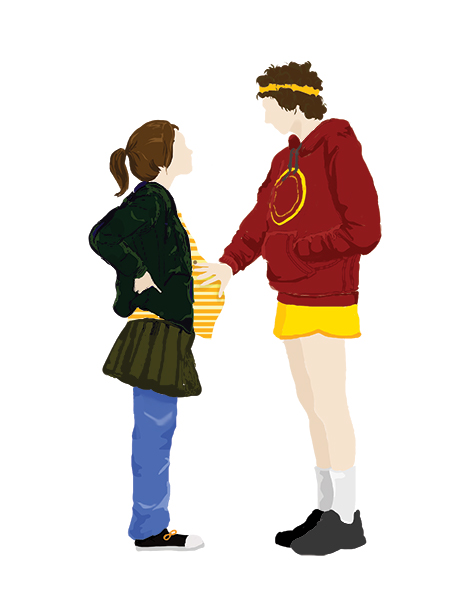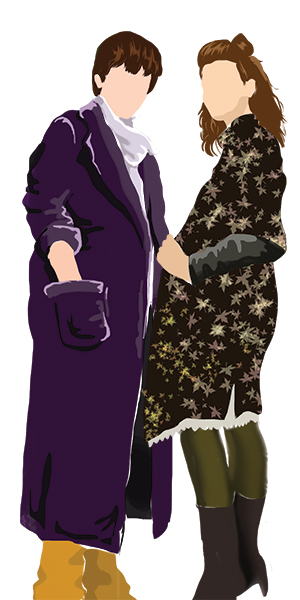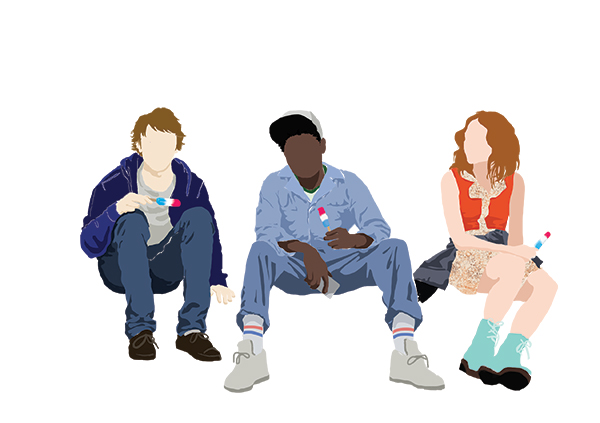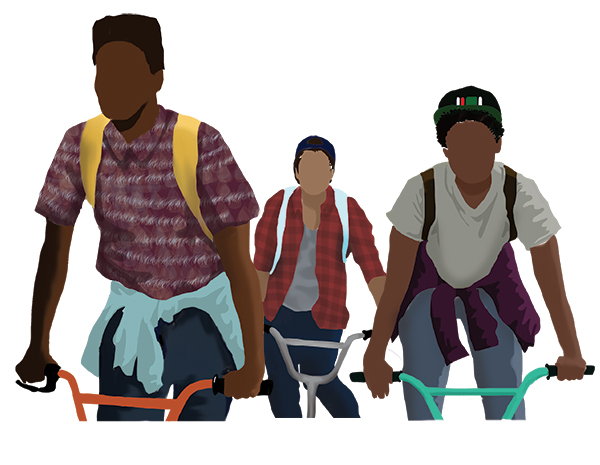C Mag Film Club: Coming of Age Movies
8 MIN READWhatever your opinion of coming of age movies, it is difficult to dispute that they have steadily become the quintessential American film genre. Compelling characters, soundtracks and well-written dialogue are key components to any successful coming of age film. Below are six of our favorites.
Juno:
 Through Ellen Page’s realistic portrayal of a jaded and darkly sarcastic teenager and screenwriter Diablo Cody’s cutting dialogue, Juno transforms the taboo topic of teen pregnancy into a light and clever comedy about a 16-year-old girl who, like the script of this film, never takes herself too seriously. Our Juno, whose name evokes the Roman goddess of childbirth, dresses like a little boy and drinks family sized containers of Sunny-D in order to counteract the results of her pregnancy tests. Needless to say, not your run-of-the mill, wife of Jupiter kind of deity. The audience follows Juno, or as she’s more colloquially known, “the cautionary whale,” as she navigates teen life and the turbulent relationships with the people around her. She and her gold-clad track-star boyfriend Paulie Bleeker “roast the broomstick” or take the “next step” in their relationship, forcing her to confront the responsibility that comes with a reckless fun night in! After an off-putting experience at the local abortion clinic, Juno, with encouragement from her best friend, responds to an eager newspaper ad from prospective adoptive parents. Juno finds herself in the home of a friendly young couple, witnessing a perfect audition from the parent candidates, Mark and Vanessa Loring. As their lives become further interwoven with her own, Juno is forced to confront the realities of growing up, in which even this seemingly perfect couple who were going to give her baby the perfect life are deeply complex and struggle with problems of their own. Juno’s journey is brought to life through the interactions with her dysfunctional family, including her father and stepmother, her baby sister, her trusty hamburger phone, and of course her beloved dog, Banana. Not to forget her awkward but devoted boyfriend whose credits include trying really hard to be the “totally boss” “cheese to [her] macaroni.”
Through Ellen Page’s realistic portrayal of a jaded and darkly sarcastic teenager and screenwriter Diablo Cody’s cutting dialogue, Juno transforms the taboo topic of teen pregnancy into a light and clever comedy about a 16-year-old girl who, like the script of this film, never takes herself too seriously. Our Juno, whose name evokes the Roman goddess of childbirth, dresses like a little boy and drinks family sized containers of Sunny-D in order to counteract the results of her pregnancy tests. Needless to say, not your run-of-the mill, wife of Jupiter kind of deity. The audience follows Juno, or as she’s more colloquially known, “the cautionary whale,” as she navigates teen life and the turbulent relationships with the people around her. She and her gold-clad track-star boyfriend Paulie Bleeker “roast the broomstick” or take the “next step” in their relationship, forcing her to confront the responsibility that comes with a reckless fun night in! After an off-putting experience at the local abortion clinic, Juno, with encouragement from her best friend, responds to an eager newspaper ad from prospective adoptive parents. Juno finds herself in the home of a friendly young couple, witnessing a perfect audition from the parent candidates, Mark and Vanessa Loring. As their lives become further interwoven with her own, Juno is forced to confront the realities of growing up, in which even this seemingly perfect couple who were going to give her baby the perfect life are deeply complex and struggle with problems of their own. Juno’s journey is brought to life through the interactions with her dysfunctional family, including her father and stepmother, her baby sister, her trusty hamburger phone, and of course her beloved dog, Banana. Not to forget her awkward but devoted boyfriend whose credits include trying really hard to be the “totally boss” “cheese to [her] macaroni.”
Through exploration of these relationships, the film maintains Juno’s endearing spirit, rebellious nature and lovable personality, perfectly captured in Ellen Page’s performance. In addition to the brilliant dialogue, a low-fi indie soundtrack carries the film, capturing its offbeat spirit. Director Jason Reitman finishes the movie with a perfect moment of quirky glory featuring Juno and Paulie playing guitar and singing a hilarious and bizarrely sweet duet rendition of the Moldy Peaches’ “Anyone Else But You.”
Sing Street:
 This coming of age musical about an eclectic gang of South-Dubliners in the 1980s kicks off with the transfer of private school kid Conor Lawlor (Ferdia Walsh-Peelo) to a rough public school, where he encounters the beautiful and mysterious Raphina. Driven by his desire to win her affection, Conor lies about being in a band and is faced with the task of actually forming one from among his seemingly talentless deadbeat classmates. Guided through the world of music by his older brother, former aspiring rock artist Brendan, and inspired by the music of Duran Duran, the Cure, the Clash and other iconic new-age bands of the era, Conor and his crew develop a new sound, a genre that they dub “Futurism.”
This coming of age musical about an eclectic gang of South-Dubliners in the 1980s kicks off with the transfer of private school kid Conor Lawlor (Ferdia Walsh-Peelo) to a rough public school, where he encounters the beautiful and mysterious Raphina. Driven by his desire to win her affection, Conor lies about being in a band and is faced with the task of actually forming one from among his seemingly talentless deadbeat classmates. Guided through the world of music by his older brother, former aspiring rock artist Brendan, and inspired by the music of Duran Duran, the Cure, the Clash and other iconic new-age bands of the era, Conor and his crew develop a new sound, a genre that they dub “Futurism.”
This motley crew is comprised of a four-foot, bucktoothed, redhead band manager and cameraman, a blue-velvet clad, rabbit-loving musical prodigy who doubles as the group’s composer, the only black Dubliner at their school with undeniable musical skill, and a feisty bald duo reminiscent of tweedledee and tweedledum who dazzle on the drums and bass. At their head is lead singer and lyricist Conor (stage name “Cosmo”), defined by his Bowie cheekbones, bold eyeliner and dress code-defying brown loafers. Brendan, who himself once nurtured dreams of pursuing music, passionately throws his support behind his brother’s band, strengthening the bond between them which gives us some of the film’s best and most heartfelt moments, illuminating Sing Street’s central themes. The film joins the ranks of director John Carney’s underrated indie movie musicals Begin Again and Once, transporting its audience with a stunning original score including songs such as “Drive It Like You Stole It” and “Up.” The band’s journey, beginning as a ploy to get a girl, transforms into a means for Conor to discover his passion for music. Sing Street is honest about the stakes of pursuing one’s dreams.
The film touches upon the sacrifices that must be made and the people one must leave behind in the pursuit of one’s goals. Characterized by nostalgic musical favorites, iconic fashion and the universal search for self-discovery, Sing Street is a hidden gem.
Moonrise Kingdom:
 Through the masterful direction and cinematography of industry god Wes Anderson, “Moonrise Kingdom” tells the storybook romance of misunderstood 12-year-olds Sam Shakusky (Jared Gilman) and Suzy Bishop (Kara Hayward) in their daring flight to escape their troubling realities and be together.
Through the masterful direction and cinematography of industry god Wes Anderson, “Moonrise Kingdom” tells the storybook romance of misunderstood 12-year-olds Sam Shakusky (Jared Gilman) and Suzy Bishop (Kara Hayward) in their daring flight to escape their troubling realities and be together.
Sam, an awkward but well-meaning orphan and khaki-scout, and Suzy, an intelligent and severely troubled young girl, both outsiders among their peers, fall in love through an innocent exchange of letters and youthful attraction to epic romance. Anderson’s unconventional decision to construct his film around the unwavering love of two preteens is conceptually funny and immediately captures the hearts of the audience. Set on a picturesque but fictional New England island in the summer of 1965, Anderson creates a strange, whimsical world that evokes a fairytale come to life. The fantastical escapist lens of these two lost children transports the audience into a bygone era, brought to life by yellow suitcases packed with fantasy novels, borrowed record players, a coonskin hunting cap and a treasured pair of Galilean binoculars.
The child stars and film newcomers are masterfully supported by a hilarious veteran cast including Bill Murray, Edward Norton, Bruce Willis and Frances McDormand. A sliding camera effect, reminiscent of the changing backdrop of a play, pulls the audience from scene to scene. From Sam and Suzy’s first meeting backstage of a bizarre operatic rendition of Noah’s Ark, to the escapades of a bloodthirsty gang of boy scouts led by a devoted, khaki-clad math teacher (Edward Norton), the beauty and surrealism of Wes Anderson’s carefully crafted world brings to light adolescents’ struggle with alienation.
Me, Earl and the Dying Girl:
 “Me, Earl and the Dying Girl,” directed by Alfonso Gomez-Rejon, follows a year in the life of high school senior and social outsider Greg Gaines (Thomas Mann), as it is turned upside down by the unconventional friendship he forms with his classmate Rachel, a girl recently diagnosed with cancer. Think “The Fault in Our Stars” but if “The Fault in Our Stars” was good. Despite being a movie about cancer “Me, Earl and the Dying Girl” is more of a comedy than a tragedy. The story is carried by Greg’s charming and distinctive narrative voice demonstrated primarily through his self-deprecating humor, including repeated descriptions of himself as “terminally awkward …[with] … a face like a little groundhog.” Before meeting Rachel, Greg and his “co-worker” Earl (his best friend since childhood, which Greg will never admit because he’s “got issues”) were content with eating Pho with their heavily tattooed history teacher and making intentionally stupid movies with titles that play on “classics of cinema,” including “A Sockwork Orange” and “A Box of ‘Lips, Wow!” At school, Greg happily leads an unobtrusive lifestyle through “citizenship in every nation,” peacefully floating between his school’s many cliques. The unusual friendship that forms between Greg and Rachel, which begins with Greg’s mother pushing him to hang out with “the Dying Girl,” forces him to finally take his emotions seriously, face the realities of his unknown future and stop worrying about what others think. The relationship that blossoms between the two of them is perfect and also tragic because we know it is doomed from the start. The film stands out by telling a love story without any romance, addressing the heartbreaking paradox of meeting the right person at the wrong time. The raw and touching relationships and character development are truly what drive this story and bring it to life. As Greg, Rachel and Earl grapple with isolation and vulnerability, their strange shared sense of humor and moments spent together allow the three friends to draw strength from each other, survive the trials of adolescence and come to terms with the fleeting nature of life.
“Me, Earl and the Dying Girl,” directed by Alfonso Gomez-Rejon, follows a year in the life of high school senior and social outsider Greg Gaines (Thomas Mann), as it is turned upside down by the unconventional friendship he forms with his classmate Rachel, a girl recently diagnosed with cancer. Think “The Fault in Our Stars” but if “The Fault in Our Stars” was good. Despite being a movie about cancer “Me, Earl and the Dying Girl” is more of a comedy than a tragedy. The story is carried by Greg’s charming and distinctive narrative voice demonstrated primarily through his self-deprecating humor, including repeated descriptions of himself as “terminally awkward …[with] … a face like a little groundhog.” Before meeting Rachel, Greg and his “co-worker” Earl (his best friend since childhood, which Greg will never admit because he’s “got issues”) were content with eating Pho with their heavily tattooed history teacher and making intentionally stupid movies with titles that play on “classics of cinema,” including “A Sockwork Orange” and “A Box of ‘Lips, Wow!” At school, Greg happily leads an unobtrusive lifestyle through “citizenship in every nation,” peacefully floating between his school’s many cliques. The unusual friendship that forms between Greg and Rachel, which begins with Greg’s mother pushing him to hang out with “the Dying Girl,” forces him to finally take his emotions seriously, face the realities of his unknown future and stop worrying about what others think. The relationship that blossoms between the two of them is perfect and also tragic because we know it is doomed from the start. The film stands out by telling a love story without any romance, addressing the heartbreaking paradox of meeting the right person at the wrong time. The raw and touching relationships and character development are truly what drive this story and bring it to life. As Greg, Rachel and Earl grapple with isolation and vulnerability, their strange shared sense of humor and moments spent together allow the three friends to draw strength from each other, survive the trials of adolescence and come to terms with the fleeting nature of life.
Dope:
 Rick Famuyiwa’s film “Dope” is a perfect down-to-earth modern film with a 90s twist. “Dope” is a timeless story about a teenage boy growing up in Inglewood, California, more commonly referred to as “the bottoms” by locals in the movie. Malcolm Adekanbi, played by Shameik Moore, followed by his two best friends, Jib and Diggy, are outsiders at their high school where they are picked on by popular kids for their geeky habits. Malcolm and his friends stay out of trouble, ignoring the popular kids by focusing on their band. Obsessed with 90s hip hop, Malcolm and his friends pass time studying and playing in their punk band Awreeoh (pronounced oreo), whom the audience can thank for the several hilarious original songs (in addition to executive producer Pharrell Williams). The kids take pride in being geeks and do not hide the fact that they enjoy school. They sing about being good kids and voice their dreams of attending college, unlike their peers. Malcolm, Diggy and Jib often poke fun at Inglewood and its gang related crimes. “Someone needs to invent an app like Waze to navigate through all these gang streets,” Jib said. However, the nerdy, crime-free lifestyle of our lovable heroes changes on their daily bike ride coming home from school when the three best friends are stopped by the town’s drug dealer, Dom, played by A$AP Rocky, who convinces them to attend his birthday party at a club that night. The kids feel an uncharacteristic obligation to listen to Dom due to his intimidating reputation, so they follow him to the club where things take a turn for the worse. Throughout the film, Malcolm is caught between two stereotypes that he does not completely fulfill: A geek who is destined for Harvard or a black “criminal” from the hood. But as he grows, he understands there is nothing wrong with being a little bit of both and learns to be proud of where he comes from.
Rick Famuyiwa’s film “Dope” is a perfect down-to-earth modern film with a 90s twist. “Dope” is a timeless story about a teenage boy growing up in Inglewood, California, more commonly referred to as “the bottoms” by locals in the movie. Malcolm Adekanbi, played by Shameik Moore, followed by his two best friends, Jib and Diggy, are outsiders at their high school where they are picked on by popular kids for their geeky habits. Malcolm and his friends stay out of trouble, ignoring the popular kids by focusing on their band. Obsessed with 90s hip hop, Malcolm and his friends pass time studying and playing in their punk band Awreeoh (pronounced oreo), whom the audience can thank for the several hilarious original songs (in addition to executive producer Pharrell Williams). The kids take pride in being geeks and do not hide the fact that they enjoy school. They sing about being good kids and voice their dreams of attending college, unlike their peers. Malcolm, Diggy and Jib often poke fun at Inglewood and its gang related crimes. “Someone needs to invent an app like Waze to navigate through all these gang streets,” Jib said. However, the nerdy, crime-free lifestyle of our lovable heroes changes on their daily bike ride coming home from school when the three best friends are stopped by the town’s drug dealer, Dom, played by A$AP Rocky, who convinces them to attend his birthday party at a club that night. The kids feel an uncharacteristic obligation to listen to Dom due to his intimidating reputation, so they follow him to the club where things take a turn for the worse. Throughout the film, Malcolm is caught between two stereotypes that he does not completely fulfill: A geek who is destined for Harvard or a black “criminal” from the hood. But as he grows, he understands there is nothing wrong with being a little bit of both and learns to be proud of where he comes from.
Boyhood:
 “Boyhood,” directed by Richard Linklater, is a unique film produced over a period of 12 years that follows the same cast of actors as their characters change and grow before the camera. Focusing on the growth of the main character Mason, played by Ellar Coltrane, the story follows him through a series of day-to-day situations that make Mason question himself and grow from every experience. Mason, an extremely ordinary Texas boy who loves reading “Harry Potter” and watching cartoons, tackles many obstacles that come with being in a divorced family. Mason witnesses his mother go from being a single parent, to the wife of an alcoholic abusive husband, to finally reaching a stable relationship. The camera guides us through the story of Mason’s life, and we see how he is affected by everything him, his sister and his mom experience. As a teenager with working parents, Mason grows up very independent; constantly facing pressure from his peers to experiment with drinking and sex. As viewers, we grow closer to him as we get to witness his firsts, including his first kiss, first love, high school graduation and first day of college. Mason’s struggle with adolescence and family issues is extremely relatable. “Boyhood” highlights the struggles of growing up in a raw and relevant way, making the audience sympathize with Mason because he feels more like a real person than a made-up character. As Mason transforms from being a first grader to a young man ready for college, his interests also shift from video games to a blooming passion for photography. Focusing on the growth of the main character Mason, “Boyhood” repeatedly gives insight about the human experience of growing up in an abstract story about a young boy and his journey through life.
“Boyhood,” directed by Richard Linklater, is a unique film produced over a period of 12 years that follows the same cast of actors as their characters change and grow before the camera. Focusing on the growth of the main character Mason, played by Ellar Coltrane, the story follows him through a series of day-to-day situations that make Mason question himself and grow from every experience. Mason, an extremely ordinary Texas boy who loves reading “Harry Potter” and watching cartoons, tackles many obstacles that come with being in a divorced family. Mason witnesses his mother go from being a single parent, to the wife of an alcoholic abusive husband, to finally reaching a stable relationship. The camera guides us through the story of Mason’s life, and we see how he is affected by everything him, his sister and his mom experience. As a teenager with working parents, Mason grows up very independent; constantly facing pressure from his peers to experiment with drinking and sex. As viewers, we grow closer to him as we get to witness his firsts, including his first kiss, first love, high school graduation and first day of college. Mason’s struggle with adolescence and family issues is extremely relatable. “Boyhood” highlights the struggles of growing up in a raw and relevant way, making the audience sympathize with Mason because he feels more like a real person than a made-up character. As Mason transforms from being a first grader to a young man ready for college, his interests also shift from video games to a blooming passion for photography. Focusing on the growth of the main character Mason, “Boyhood” repeatedly gives insight about the human experience of growing up in an abstract story about a young boy and his journey through life.

